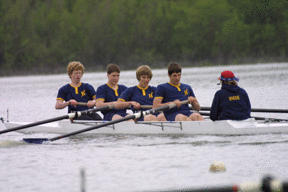With 300 meters to go in Saturday’s Northwest Regional Junior Championships in Vancouver, Wash., the Bainbridge Island Rowing Club’s boys’ four-oared shell with coxswain was in fourth, about two lengths behind the lead boat.
“Generally things don’t change much at that point,” said coach Jay Trinidad.
Bainbridge made an exception.
“They just exploded,” said Trinidad. “When you pass another boat, usually it’s a seat per stroke. They were like a freight train, passing two seats with every stroke.”
The boat – with Ross Henshaw, Francis Toglia, Rory Hiett, Peter Mandell and cox Alex Riede – surged into first in the final two or three strokes, edging Lakeside by .36 of a second and Green Lake by one second.
Taping the race, Trinidad was in the midst of a group of Bainbridge parents and rowers.
“I’ve been to U2 and Bruce Springsteen concerts,” he said, “and I’ve never heard anything as loud as when it looked like they would do it. People were hugging and cheering and laughing.”
Moments after crossing the finish line, Riede stood up in the boat and performed an impromptu dance.
Because the boat was in the novice class, it was the team’s final race of the season.
“There was a sense of purpose coming off the water that I hadn’t seen before,” said Trinidad. “To a man, everyone said, ‘Next year we’re going to Nationals.’”
Though Riede is a senior, all four rowers will be back next year.
And as if winning a regional championship in their first season wasn’t enough, the program may have received an even greater accolade the following day.
After the boys’ eight had finished fifth in their heat, a BIRC rower overheard the Lakeside coach tell his team, which had finished fourth, “You guys have a lot to be proud of – you beat Bainbridge.”
“I never thought I’d hear that,” said Trinidad, “let alone in our first year.”
No pain, no gain
This upbeat ending was a sharp contrast to what Trinidad had gone through just to get to the race.
After team members had departed for Vancouver on Thursday afternoon, Trinidad and the small remaining group realized that the boats had been loaded improperly on the borrowed trailer. After shifting them, the trailer lighting didn’t work and that problem required 45 minutes to repair. Within 250 yards after finally starting, the electric brakes locked. Another half hour to fix.
All went well until just 40 miles north of Vancouver – by now it was 10 p.m. and raining heavily – when the Suburban towing the trailer had a flat. After a call to AAA and yet another hour, the trip resumed.
Arriving at the regatta site at 11:30, they couldn’t get in the main gate. But Trinidad noticed a chain down on an exit. What he didn’t notice was an unlabeled tire-ripping strip. With his car preceding the Suburban and trailer, its two left tires were shredded.
Everyone piled into the Suburban, which soon got lost trying to find the hotel. Trinidad got out to ask directions and stepped in a pothole, badly twisting an ankle.
“I could barely breathe, I was in so much pain,” he said, initially thinking he’d broken it and lying awake for most of the night after their 1:15 a.m. arrival at the hotel. Though he hadn’t, he wore a borrowed walking cast during the weekend.
But his crews’ performance lessened the pain.
“The boys’ four didn’t win,” he observed. “The whole team won. Everybody had a sense of accomplishment.”
While none of the other boats made it out of their qualifying heats, that wasn’t important.
“I don’t care if they win,” Trinidad said. “I just want them to feel good about how they rowed.
“It’s a different ethic from all other sports I’ve been involved with. It takes a lot to keep going hard once you know you haven’t won. Your body is telling you to stop, but you discipline yourself to keep going. The other rowers are depending on you.
He put the team’s initial competitive season in perspective.
“None (of the boats) is less than 10 years old. Our oars are banged up. I coach from a launch with a 16-year-old engine. We have no boat house, no full-time coaching staff, no rowing machines in an enclosed warm area.
“But we have a real hunger to do well. The Cascade coach said, ‘What you guys proved is that money doesn’t make fast boats. Good rowers make fast boats.’
“In 25 years, when Bainbridge Island has a trailer full of new boats, these kids will look back with pride that they were the first ones to do it. It’s easy to walk into an established program with a lot of championship banners. But it takes a lot of guts for these kids to be the pioneers of rowing on the island.”



